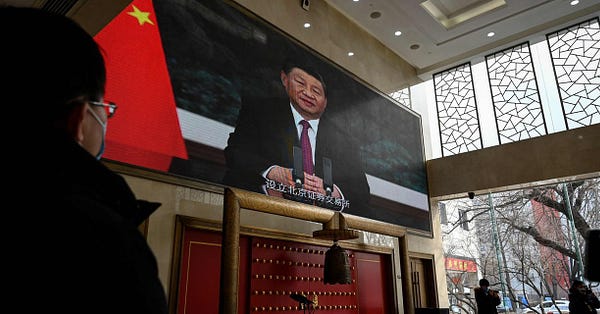Welcome to the 105th edition of Trade War.
China sets a growth target for 2022 of around 5.5 percent, the lowest in over a quarter century. Beijing orders food delivery giant Meituan to cut fees. And Washington considers levying trade penalties against Beijing’s use of industrial subsidies.
Debate continues whether China knew in advance of the Russian invasion. Beijing won’t break with Moscow because of shared concerns over U.S. hegemony. And a EU chief says China should play a mediating role in the conflict.
GDP target of 5.5% lowest in quarter century
China has set a growth target for this year of around 5.5 percent, the lowest level in more than a quarter century, reports The Wall Street Journal’s Jonathan Cheng.
The target, announced by premier Li Keqiang in his work report at the opening of the annual legislative session, is lower than last year’s six percent or more; China exceeded that target growing 8.1 percent in 2021.
Beijing-led efforts to deleverage property companies and rein in technology entrepreneurs have put downward pressure on the overall economy, with a marked slowdown emerging at the end of last year.
“The economy came into the year with a sharp deceleration in year-over-year growth, from double-digit percentage levels in the first half of 2021 to just 4 percent growth in the final quarter,” writes Cheng.
This year will very likely be tougher with rising geopolitical uncertainty over Russia’s invasion of Ukraine hitting weak domestic consumption. Home sales are falling for China’s 100 largest property developers and consumer buying power is still below pre-pandemic levels.
“The risks and challenges that China faces will increase significantly this year,” premier Li said in Beijing. “In the face of new downward pressures, steady growth should be given more prominence.”
Central transfers to cash-strapped local governments, many hurting in the property slowdown, will grow by 18 percent in 2022, the highest in years, while special-purpose bonds,. mainly earmarked for infrastructure, will amount to 3.65 trillion yuan, up from an issuance of 3.43 trillion yuan in 2021.
The premier’s work report mentioned “common prosperity” only once and did not reference a property tax, a measure that was raised last year as important to create a more equitable society, reports Cheng.


Or is China’s growth target high?
“I’m more impressed by how HIGH the target is: 5.5 percent is at the top end of all estimates for China’s growth this year that we found. IMF lowered their estimate from 5.6 percent (Oct. ‘21) to 4.8 percent (Jan. ‘22),” writes Center for Strategic & International Studies Trustee Chair Scott Kennedy in a tweet thread.
”China’s economy faces [a] long list of headwinds: lots of debt, an aging population, an unenthusiastic private sector, flagging household consumption, zero-Covid, policy opacity and unpredictability, continuing tensions with the US and West, & the war in Ukraine and sanctions,” writes Kennedy. “I agree with Li Keqiang’s own assessment: “Achieving this goal will require arduous efforts.””
What are the policy implications? “Boosting growth now is priority over long-term goals to transition to consumption-driven economy, raise productivity & decarbonize. There'll be a larger stimulus than expected, through looser monetary policy and fiscal transfers to local governments.”
Kennedy says the best thing to read to start to understand China’s economic challenges is a late January IMF report card on the Chinese economy. (That’s the same IMF report you readers were introduced to in Trade War 100.)


The big document drop
“The big document drop!” tweets Kendra Schaefer, a partner at Trivium China, noting that the premier’s annual work report is one of the “most important indicators of China’s policy priorities for the year.”
Here is a link to the English version of the premier’s work report.


Food delivery giant Meituan to cut fees
Under pressure from Beijing, China’s food delivery giant Meituan is cutting the fees it charges restaurants, report Bloomberg News’ Jane Zhang and Vicky Feng.
Meituan announced in a company statement (Chinese) it will cut the commissions it charges on small and medium-sized merchants, including those in areas hit by the pandemic, as ordered earlier by China’s regulators. Rival Ele.com, owned by Alibaba, has said it will also cut commissions.
“Meituan has been grappling with regulatory and public scrutiny on multiple fronts, including its market power, the welfare of delivery riders and the size of commissions it charges restaurants,” reports the financial news service.
After Beijing issued the fee cut guidelines, Meituan’s stock fell by 15 percent, wiping out $26 billion in market value, Bloomberg reported on February 18.

Biden team mulls industrial policy showdown
The Biden administration is considering levying new trade sanctions on China, report The Wall Street Journal’s Yuka Hayashi, Lingling Wei and Alex Leary.
The U.S. is mulling using Section 301 of the Trade Act to investigate China’s industrial subsidies, according to people familiar with the discussion, reports the Journal.
“The approach is motivated by growing convictions within the Biden administration that former President Donald Trump’s tariff campaign against Chinese imports failed to persuade Beijing to compete fairly in international trade,” writes the business paper.
“The Office of the U.S. Trade Representative said in its annual policy agenda on Tuesday that it is realigning its China policy to confront Beijing’s nonmarket practices but didn’t provide new details on specific measures.”
“A fresh 301 investigation could have severe repercussions, according to some Chinese officials and government advisers, who say China might respond with retaliatory measures of its own—including adding U.S. companies to its “unreliable entity” list barring them from the Chinese market,” reports the Journal.


Was China played by Russia?
Despite what many believe, China was likely not aware in advance of Putin’s plan to invade Ukraine, writes Stimson Center’s China program director Yun Sun.
“Since the beginning of the Russian invasion of Ukraine, one of the most intriguing questions related to China is whether Beijing had been informed of the plan when China and Russia issued their Joint Statement on February 4,” writes Yun Sun.
“Given the strong language about mutual support in that document, if China did indeed know, it would mean it had played the role of an accomplice . . . a careful examination of the events suggests that China was, in fact, played.”
Yun Sun holds up as support for her theory the fact that China’s embassy in Ukraine seemed unprepared for the invasion. “The Chinese Embassy in Kyiv denied the possibility of a war as recent as the week of February 14 and had made no evacuation effort or plan until after Russia launched its full-scale invasion.”
The embassy didn’t even begin to register the 6,000-plus Chinese nationals in Ukraine until after the invasion began then scrambled to help with their evacuation.
“After realizing that chartered planes were not an option due to the war, the embassy started to coordinate “other means” on February 27. Given the high importance of protecting overseas Chinese nationals in the war zones for Beijing (as repeatedly portrayed in the infamous “Wolf Warrior” movie series), it is unthinkable that Beijing knew but did not bother to prepare.”
Or did Beijing expect a ‘fast, light touch’ invasion?
“There are alternatives that arguably fit the facts better than China getting "played,"“ writes the German Marshall Fund’s Andrew Small in a tweet rebuttal. “For a start, Xi can perfectly plausibly have been given a heads-up by Putin without thinking that this needed to be shared so widely.”
“The piece credibly argues that China may have thought that Russia would use the threat of invasion for coercive purposes (others did too). But if Moscow did invade, China may also have thought that the intervention would be fast, light touch, and successful.”


China’s logic on Putin attack ‘seriously warped’
“The logic of China’s refusal to denounce Putin’s attack on Ukraine is becoming clear. And it’s seriously warped, leaving Beijing in a self-imposed trap,” writes Paul Heer, former National Intelligence Officer for East Asia, in a tweet thread. “To understand it, we need to go back to the 4 February Sino-Russian joint statement.”
“The reason Xi can’t break from Moscow is not that he’s so invested in Putin, but that he is so invested in the principles in that statement: multipolarity, anti-US-hegemonism, and the “five principles of peaceful coexistence”—from which Ukraine apparently can be excluded,” notes Heer.
Beijing’s statements on the Russian invasion of Ukraine keep mentioning “legitimate security interests,” or as it was put in the Chinese-Russian Feb. 4 statement: “No state can or should ensure its own security . . . at the expense of the security of other states.”
“This was Moscow’s complaint against NATO expansion, which Beijing endorses because it resonates with China’s position on Taiwan and the US alliance network in East Asia. The 4 February statement essentially equates NATO expansion with the US Indo-Pacific strategy.”

EU foreign policy chief: China must mediate
With Europe and the U.S. unable to mediate the Russia-Ukraine crisis, China must play a role, according to a EU chief, reports the South China Morning Post.
Even while defending the decision to send weapons to Ukraine and impose tough sanctions on Russia, EU foreign policy chief Josep Borrell has spoken out in support of China having a role mediating in Russia’s invasion of Ukraine.
“There is no alternative. We [Europeans] cannot be the mediators, that is clear . . . And it cannot be the US either. Who else? It has to be China, I trust in that,” Borrell told Spanish newspaper El Mundo.
Borrell, who is from Spain, noted that there are no plans in place for China to play this role. “We haven’t asked for it and they [the Chinese] haven’t either.” Still, “diplomacy must play its part,” and China “must play a role,” he said.


Mixed impact on Asia’s economies
“The impact of the Russia-Ukraine war on Asia’s overall trade is expected to be limited, as Russia and Ukraine account for only 2.5% of Asia’s imports and 1.5% of Asia’s exports. Developing Asia also accounts for only 5% of FDI in Russia,” writes Asian Development Bank Chief Economist Albert Park, in a tweet thread.
The exception, however, will be countries in Central Asia, the Caucasus and Mongolia, all of which have close trade links with Russia and Ukraine and could be hurt badly, Park explains.
“The biggest impact of Russia-Ukraine war on Asian economies will be higher oil and gas prices, which will fuel inflation and slow growth in energy-importing countries, but help net exporters,” writes Park.
Food prices will also go up: “Russia and Ukraine supply 22% and 18% of global wheat and barley exports, Ukraine supplies 15% and 12% of global rapeseed and corn exports, and Russia supplies 12% of global fertilizer exports.”

Notable/In Depth
“Can members of the Chinese Communist Party (CCP) express political disagreement with the Party centre in public? Theoretically speaking, the answer is a definite no,” writes Olivia Cheung, a research fellow at the SOAS China Institute, SOAS, University of London, in a new article on political contention in China published in The China Quarterly.
“In reality, however, Party elites have repeatedly, self-righteously and very publicly trampled on these restrictive formal rules and norms. Mao Zedong's 毛泽东 Cultural Revolution from 1966 to 1976 and Deng Xiaoping's 邓小平 southern tour in 1992 were epoch-making examples.”

Following Putin’s invasion of Ukraine, “the economic isolation imposed on Russia has been a stark reminder of the persistence of American power,” write Bloomberg News’ Shawn Donnan, Enda Curran, and Rich Miller.
“China is catching up to the U.S. in terms of gross domestic product, and already eclipsed it in trade and manufacturing. But when it comes to the architecture of money that underpins the world economy, America and its dollar-led system remains the undisputed leader.”

Here is a thought-provoking conversation between Jeff Bader, former Senior Director for China Affairs at the National Security Council, and SupChina’s Kaiser Kuo - listen to it here. (Recorded before Russia’s invasion of Ukraine.)


Another China book is out that I look forward to reading, America 2nd: How America’s Elites are Making China Stronger, by Isaac Stone Fish, journalist and founder and CEO of Strategy Risks.
Montana picture
A recent Friday hike in the sun.






